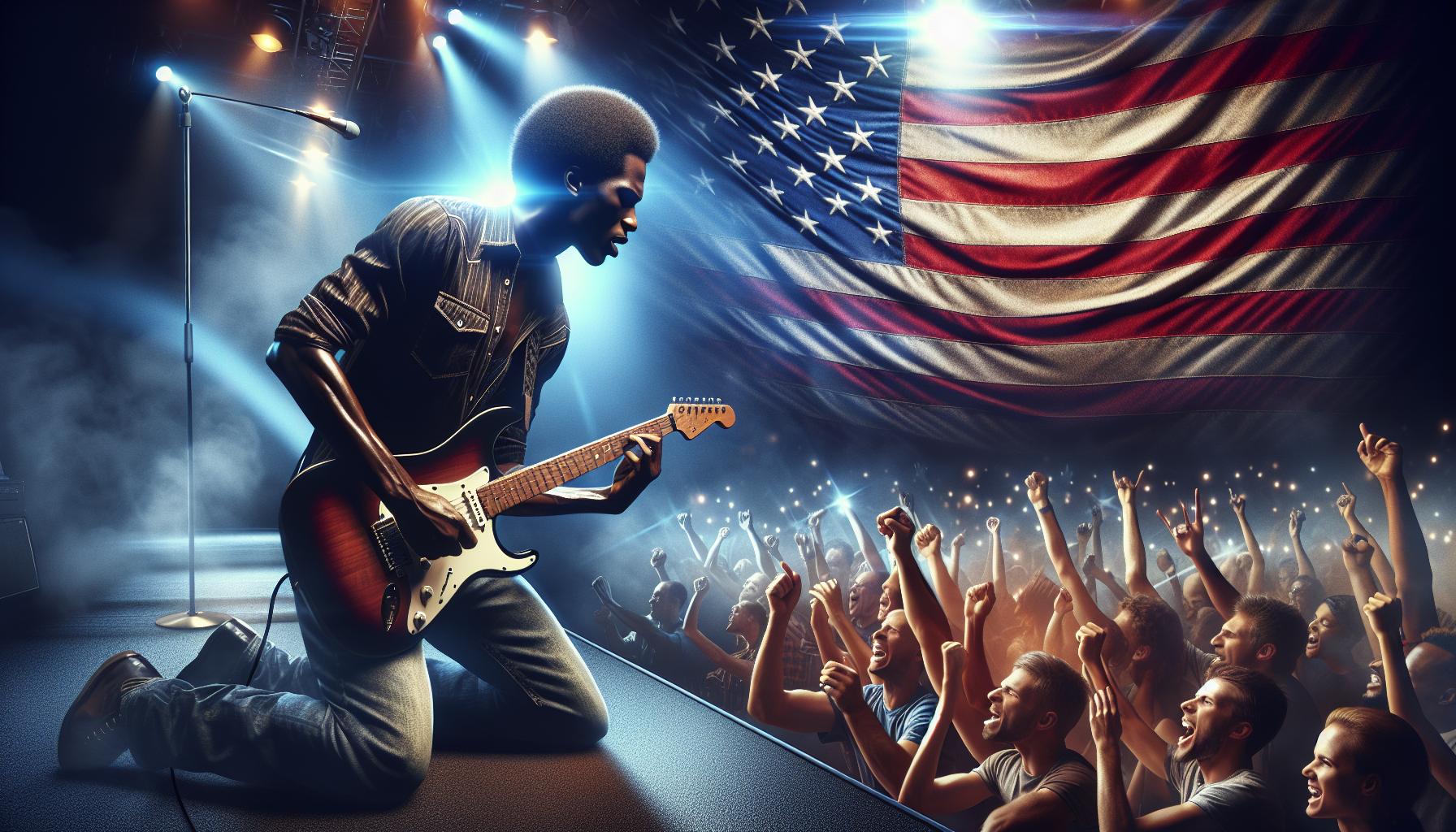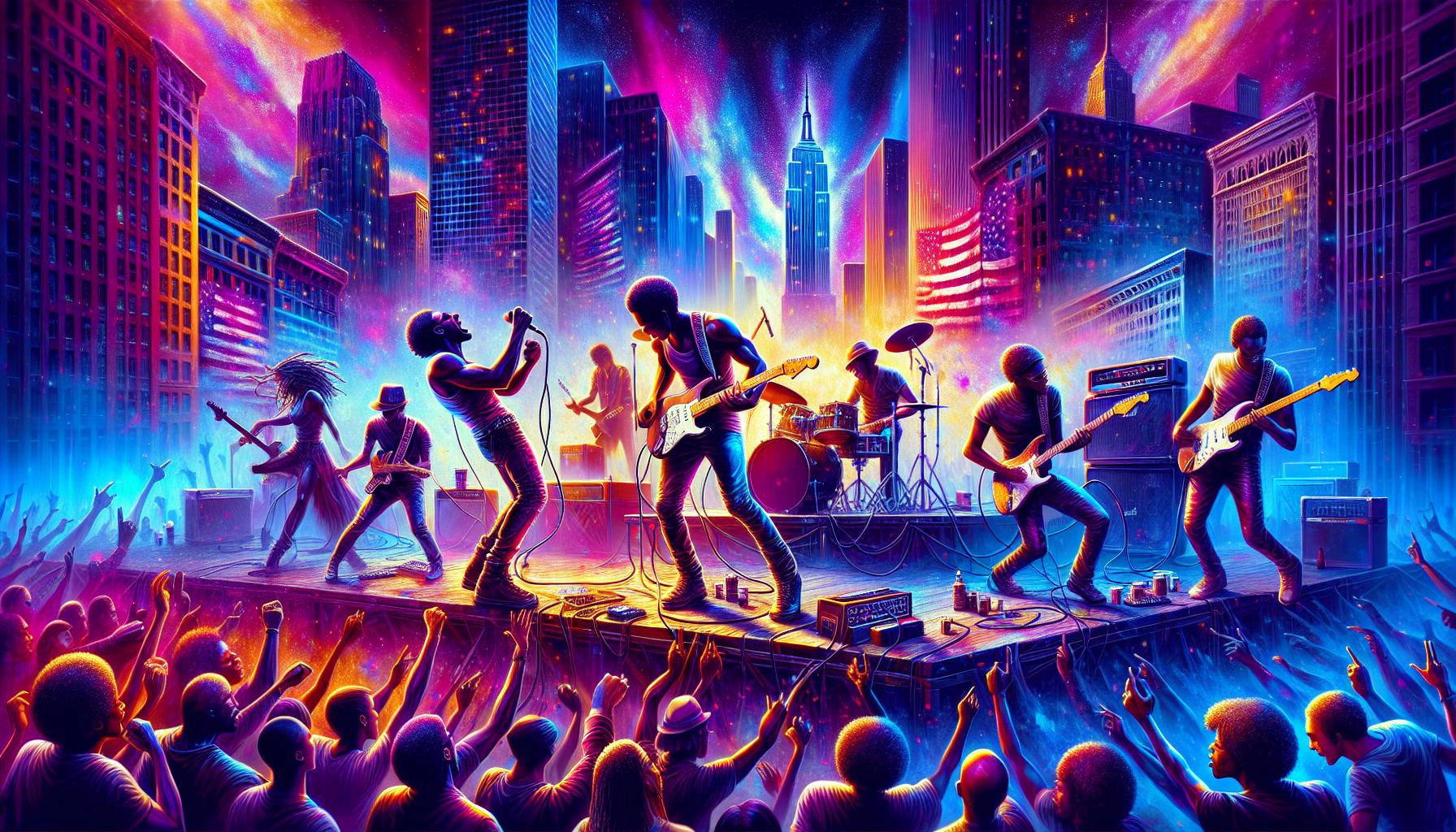Black rock music is a vibrant and often overlooked genre that blends the raw energy of rock with the rich cultural heritage of Black artists. As I dive into this unique musical landscape, I find it fascinating how it challenges stereotypes and showcases the diverse talents within the Black community. From the soulful riffs of legendary pioneers to the modern sounds of today’s trailblazers, Black rock music has continuously pushed boundaries and redefined what rock can be.
In exploring this genre, I aim to highlight the influential figures and movements that have shaped its evolution. It’s not just about music; it’s about identity, expression, and the powerful stories that resonate through every note. Join me as I uncover the dynamic world of Black rock music and celebrate the artists who’ve made their mark on this genre.
Key Takeaways
- Genre Fusion: Black rock music uniquely blends elements of rock, rhythm and blues, jazz, funk, and hip-hop, showcasing the diversity of Black musicians.
- Cultural Influence: The genre serves as a powerful platform for addressing social issues, identity, and cultural heritage, resonating deeply within Black communities.
- Historical Significance: Key figures like Chuck Berry and Jimi Hendrix were pivotal in shaping Black rock music, influencing countless artists and the broader rock landscape.
- Modern Trailblazers: Contemporary artists such as Gary Clark Jr. and Janelle Monáe continue to redefine the genre, pushing creative boundaries and integrating their cultural backgrounds into their music.
- Afro-Punk Movement: This movement has amplified Black rock’s visibility, encouraging new generations of artists to embrace their identities and challenge traditional perceptions of rock music.
- Mainstream Impact: Black rock music’s ongoing influence on mainstream genres fosters greater diversity and encourages critical discussions about race and identity in popular music.
Black Rock Music
Black rock music blends the raw energy of rock with the cultural heritage and unique experiences of Black artists. This genre emerged in the mid-20th century, with roots tracing back to rhythm and blues, jazz, and gospel. Influential figures like Chuck Berry and Jimi Hendrix paved the way, challenging norms and reshaping the landscape of rock music.
Black rock musicians articulate powerful messages through their lyrics, addressing identity, social justice, and personal experiences. Artists such as Living Colour and Bad Brains exemplify this, infusing their music with cultural significance while pushing musical boundaries.
Black rock music defies stereotypes, showcasing the diverse talents of Black musicians across various styles. It extends beyond traditional rock, incorporating elements of funk, soul, and hip-hop. This genre’s adaptability allows artists to explore new sounds and themes, attracting audiences worldwide.
Key movements, like the Afro-Punk movement, further amplify Black rock’s visibility, encouraging new generations of artists to embrace their identities and redefine the genre. By celebrating Black rock music, I emphasize its integral role in the larger music landscape, where it continues to inspire and innovate.
Historical Background

Black rock music emerged in the mid-20th century, influenced by various genres and artists. This genre reflects the rich cultural heritage and unique experiences of Black musicians.
Origins and Influences
Black rock music’s origins trace back to the fusion of rhythm and blues, jazz, and gospel. Artists like Chuck Berry introduced rock elements into their R&B roots, setting a precedent for future musicians. The gritty sound of blues also impacted the genre, contributing emotional depth and authenticity. The improvisational aspects of jazz allowed Black rock artists to showcase their virtuosity, while gospel’s spiritual themes influenced lyrical content. Additionally, punk rock’s rebellious nature resonated with many Black artists, creating a space for self-expression and social commentary.
Key Figures and Bands
Several key figures shaped the landscape of Black rock music. Chuck Berry, often called the “Father of Rock and Roll,” defined the genre with hits like “Johnny B. Goode.” Jimi Hendrix revolutionized the guitar with his innovative playing style, blending rock with psychedelic elements. Bands such as Living Colour and Bad Brains brought socio-political themes into their music, addressing issues of race and identity. The Afro-Punk movement also played a crucial role, promoting Black artists and forging connections between punk and Black culture. These figures and movements demonstrate the vast influence of Black rock musicians on the music industry, inspiring future generations to explore their identities through music.
Characteristics of Black Rock Music

Black rock music features a blend of powerful musical elements and profound cultural significance. This genre uniquely combines influences from its roots, showcasing the artistic diversity of Black artists.
Musical Elements
Black rock music incorporates electric instrumentation, heavy guitar riffs, and strong rhythmic foundations. Artists blend elements from rhythm and blues, jazz, and punk, resulting in a sound that’s both innovative and authentic. The incorporation of improvisation, drawn from jazz, allows for expressive performances. Additionally, Black rock musicians often use dynamic vocal styles that range from melodic singing to aggressive shouting, enhancing emotional intensity. Songs frequently feature themes built on strong backbeats, complex chord progressions, and catchy hooks, creating an engaging listening experience. For instance, bands like Living Colour and artists like Jimi Hendrix exemplify this blend, crafting tracks that resonate across diverse audiences.
Cultural Significance
Black rock music serves as a voice for social issues and cultural identity, providing a platform for expression. As a medium, it highlights the struggles and aspirations of Black communities, employing lyrics that confront racism, inequality, and identity. The genre embodies a rebellious spirit, similar to punk rock, empowering artists to challenge societal norms. The Afro-Punk movement plays a vital role in this cultural landscape, promoting Black voices within punk and rock spaces. Through live performances and community engagement, this movement fosters a sense of belonging and pride among Black rock musicians and fans. The cultural significance of Black rock music extends beyond entertainment; it resonates with anyone seeking authenticity and connection to their roots.
Notable Black Rock Artists

Black rock artists exemplify the genre’s diversity and innovation. Their contributions resonate across various movements, redefining rock music’s landscape.
Modern Influences
Modern Black rock artists push boundaries and redefine genres. Artists like Mavis Staples, known for her gospel roots, merges rock, blues, and soul. Gary Clark Jr. brings blues-rock to mainstream audiences with his soulful guitar riffs and powerful vocals. Donita Sparks, frontwoman of L7, influences the grunge scene, showcasing the power of Black female voices in rock. Fishbone blends rock, funk, and ska, challenging racial stereotypes within the genre. Janelle Monáe incorporates rock into her eclectic sound, addressing social issues and identity. These contemporary figures inspire the next generation of Black artists, merging their cultural heritage with innovative musical expressions.
Legacy Artists
Legacy Black rock artists laid the groundwork for future generations. Chuck Berry spearheaded the integration of rock and R&B, influencing countless musicians. Jimi Hendrix revolutionized guitar techniques and stage presence, becoming a pivotal figure in rock history. Sister Rosetta Tharpe, dubbed the “Godmother of Rock and Roll,” blended gospel with rock, inspiring artists like Elvis Presley and Johnny Cash. James Brown, often called the “Godfather of Soul,” infused rock with funk, shaping the genre’s rhythmic complexity. Bad Brains, pioneers of hardcore punk, combined reggae and rock, voicing the frustrations of marginalized communities. These artists laid the foundation, demonstrating the genre’s potential for expression and empowerment.
Impact on Mainstream Music
Black rock music significantly influences mainstream music across various genres. The integration of Black musicians into the rock landscape reshapes popular music, introduces new sounds, and diversifies artistic expression.
Influence on Rock Bands
Many mainstream rock bands draw inspiration from Black rock artists. Bands like The Rolling Stones and Aerosmith often cite Chuck Berry and Jimi Hendrix as major influences in their work, blending traditional rock elements with rhythms derived from R&B and blues. This cross-pollination leads to a richer, more diverse rock sound that broadens audience appeal.
Expansion of Genres
Black rock music fosters genre-blending that impacts mainstream music evolution. Artists integrate elements of hip-hop, funk, and jazz into their rock productions, creating subgenres like nu-metal and rap-rock. Groups like Linkin Park and Rage Against the Machine exemplify this fusion, attracting diverse audiences and promoting cross-cultural collaborations.
Social Issues in Music
Black rock musicians address pressing social issues through their lyrics, profoundly influencing mainstream music’s narrative. Living Colour’s “Cult of Personality” and Bad Brains’ messages reflect social justice themes that resonate with wider audiences. These artists challenge mainstream musicians to engage in dialogue about race, identity, and opposition to systemic injustice.
Rising Popularity
The resurgence of interest in Black rock music brings previously marginalized artists to the forefront. The Afro-Punk movement promotes Black rock musicians, resulting in festivals and platforms that highlight diverse talent. This visibility encourages mainstream music producers and record labels to invest in Black rock artists, expanding their reach and impact.
Cultural Representation
Black rock artists help diversify cultural representation in popular music. Increasing recognition of their contributions invites broader conversations about inclusion and representation within the music industry. Through this visibility, Black rock music not only enriches the musical landscape but also inspires future generations of artists to explore and express their identities authentically.
Black rock music is a powerful testament to the creativity and resilience of Black artists. It’s a genre that not only entertains but also challenges societal norms and sparks important conversations about identity and justice. The rich history and dynamic sound of Black rock continue to inspire musicians and fans alike.
As I delve deeper into this genre, I find it fascinating how it blends various musical influences while addressing pressing social issues. The contributions of legendary artists and modern innovators alike showcase a vibrant community that deserves recognition and celebration. I encourage you to explore the diverse sounds of Black rock music and appreciate its profound impact on both the genre itself and the broader musical landscape.



